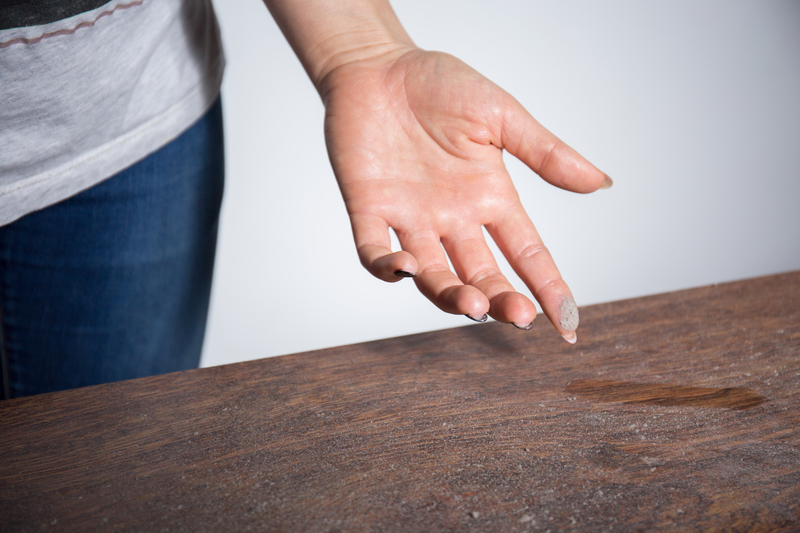Sparkling Secrets: Discover Top Jewellery Cleaning Methods
Posted on 26/08/2025
Sparkling Secrets: Discover Top Jewellery Cleaning Methods
Jewellery is more than just an accessory--it's an expression of style, sentiment, and often significant investment. However, keeping your treasures gleaming and vibrant requires more than a quick polish. Whether it's a cherished diamond ring, vintage pearl necklace, or statement silver cuff, regular jewellery cleaning is essential. In this comprehensive guide, you'll uncover expert-recommended methods, insider secrets, and practical tips for cleaning a wide array of jewels safely and effectively at home.

Why Is Proper Jewellery Cleaning Crucial?
- Restores Shine: Daily wear causes dirt, oil, and grime to build up, dulling jewels' brilliance.
- Prevents Damage: Regular cleaning removes residues that can erode or scratch precious metals and gemstones.
- Extends Lifespan: Proper maintenance of jewellery helps preserve both the appearance and integrity of your favorite pieces.
- Hygiene: Clean jewellery minimizes bacteria, allergens, and potential skin irritants.
Understanding Your Jewels: Materials Matter
Before attempting any jewellery cleaning techniques, it's vital to recognize the type of jewellery you own. Different materials require different handling. Missteps can permanently spoil or weaken your cherished items.
- Gold: Tough but susceptible to scratching. Avoid harsh chemicals.
- Silver: Prone to tarnish but typically durable.
- Platinum: Rarely tarnishes but collects grime easily.
- Diamonds: Hard, but settings must be protected.
- Pearls & Opals: Delicate and porous--require special care.
- Gemstones: Varied; some stones are soft and sensitive (e.g., turquoise, emerald).
- Costume jewellery: Often made of plated metals or glue-set stones: never soak.
DIY Jewellery Cleaning at Home: Safe and Effective Methods
1. Gentle Soap and Warm Water: Your All-Purpose Formula
This classic method is suitable for most jewellery cleaning needs, especially for gold, platinum, diamonds, and sapphires.
- Fill a bowl with warm (not hot) water and add a few drops of mild dish soap.
- Soak jewellery for 15-20 minutes.
- Use a soft-bristled toothbrush to gently scrub away grime, especially under settings.
- Rinse thoroughly in lukewarm water.
- Dry with a microfiber cloth.
Tip: You can add a few drops of ammonia for diamonds (never for pearls or soft gemstones). Avoid chlorine-based cleaners.
2. Baking Soda & Aluminium Foil: A Secret for Silver Sparkle
Silver jewellery is notorious for tarnishing, but this method reverses oxidation safely.
- Line a bowl with aluminium foil, shiny side up.
- Sprinkle a layer of baking soda and a pinch of salt.
- Place the silver items on the foil.
- Pour hot (not boiling) water to cover items. The chemical reaction cleans tarnish within minutes.
- Rinse and polish with a soft cotton towel.
Important: Do not use this method for items with oxidized (blackened) details or glued stones.
3. Toothpaste: A Quick Fix (With Caution)
Toothpaste, with baking soda as an abrasive, is popular for cleaning gold and silver jewellery. However, it should be used sparingly and gently to avoid scratching.
- Squeeze a small dab of non-gel toothpaste onto a soft cloth.
- Gently rub the jewellery (avoiding any stones or enamel).
- Rinse thoroughly and dry.
Warning: Avoid toothpaste on pearls, opals, soft gemstones, or plated jewellery.
4. Special Care for Pearls & Porous Gems
Pearls, opals, and turquoise are beautiful but extremely delicate. They are easily damaged by moisture, chemicals, or abrasion.
- Wipe after each wear using a soft, damp (not wet) cloth to remove oils and perspiration.
- If deeper cleaning is required, dip a clean cloth in a solution of water and mild soap, then gently wipe pearls and dry immediately.
- Never soak pearls, and avoid ultrasonic cleaners.
Tip: Store pearls or porous gems separately in soft pouches to avoid scratches and tangles.
5. Commercial Jewellery Cleaners
There are numerous commercially available jewellery cleaning solutions, each formulated for specific materials.
- Check the label to ensure the cleaner is safe for your type of jewellery.
- Follow manufacturer instructions closely.
- Rinse and dry thoroughly.
Note: Commercial dips can be too strong for delicate or vintage pieces--always spot test first.
6. Ultrasonic and Steam Cleaners: Professional Results at Home
Ultrasonic cleaners use high-frequency sound waves, while steam cleaners blast away stubborn grime. Both are effective for hard stones and metals but should never be used on pearls, opals, emeralds, or glued-in stones.
- Follow device instructions and select the appropriate cleaning cycle.
- Inspect jewellery carefully post-cleaning to ensure settings are secure.
- Avoid using these machines on antiques, fragile, or porous gems.
What Not to Do: Common Jewellery Cleaning Mistakes
- Never use bleach, acetone, or harsh chemicals.
- Avoid using paper towels or tissues which can scratch metals and stones.
- Do not soak costume jewellery: water loosens glues and can damage plating.
- Don't use abrasive cleaners on soft or delicate gemstones.
- Never clean valuable or antique items without consulting a trusted jeweler.
How Often Should You Clean Your Jewellery?
The frequency of cleaning depends on how often you wear each piece:
- Daily wear rings, especially engagement and wedding bands: Clean every 1-2 weeks
- Frequent wear earrings or necklaces: Wipe after each use; deep clean every few weeks
- Occasional or special-occasion pieces: Clean before and after use, inspecting for residue or wear
- Pearls: Wipe after each wear; professional cleaning yearly
Jewellery Polishing & Professional Maintenance
Professional Polishing
Over time, even the best-maintained jewels develop micro-scratches and dullness. Professional polishing restores luster and checks for loose stones or weak settings. Visit your jeweler at least annually for a check-up.
Rhodium Plating & Restoration
White gold's signature shine comes from a rhodium plating, which wears off over time. Professional re-plating renews appearance and provides added protection.
Storing Your Jewellery: A Key Secret to Lasting Sparkle
- Store each piece separately in soft pouches or compartments to avoid scratches.
- Keep away from direct sunlight, heat, and excessive humidity.
- For silver, use anti-tarnish strips or cloth-lined boxes.
- Secure clasps and fastenings to maintain the integrity of strands and chains.
Frequently Asked Questions About Jewellery Cleaning
Can I use vinegar or lemon to clean jewellery?
While hailed online, acidic substances like vinegar or lemon juice can corrode settings, damage pearls and stones, or discolor metal. Stick with mild, non-acidic cleaners.
What's the best way to polish a diamond ring?
A combination of warm water, dish soap, and a soft brush is safest for diamonds. Avoid touching the stone directly to prevent transferring oil.
Is ultrasonic cleaning safe for all jewellery?
No--never use on pearls, opals, turquoise, emeralds, antique or glued-set pieces.
Should I remove jewellery before showering or swimming?
Yes--chemicals in soaps, shampoos, chlorine, and saltwater can cause buildup, oxidation, and deterioration of both metals and stones.

Expert Advice: When to Seek Professional Help
While home cleaning suffices for routine care, consult a qualified jeweler for:
- Antique, heirloom, or delicate jewellery
- Loose stones or compromised settings
- Heavily tarnished or damaged pieces
- Valuable gems requiring advanced restoration
Trusting a professional ensures safe, thorough cleaning and long-term preservation.
Conclusion: Master the Art of Jewellery Cleaning
With these sparkling secrets, you can keep your treasured collection looking fabulous year-round. By understanding each piece's unique needs, using the correct jewellery cleaning methods, and practicing proper storage, you'll safeguard your jewellery's value, brilliance, and beauty for years to come. Make these tips part of your regular self-care routine and watch your favourite pieces shine like new!
For the ultimate sparkle, remember: when in doubt, ask your jeweller!
Latest Posts
Discover the Best Carpet Cleaning Tools Available
Sparkling Secrets: Essential Jewellery Cleaning Techniques
Master the Art of Professional Car Cleaning
Ultimate Guide for Tenants: End of Tenancy House Cleaning
Mastering the Art of Cleaning Burnt-on Residue from Your Stovetop








